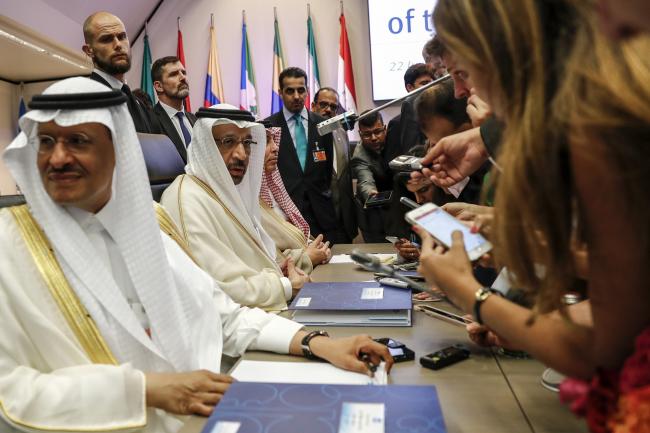(Bloomberg) -- Oil extended gains after Saudi Arabia ousted its long-time energy minister before an OPEC+ committee that monitors compliance with output cuts meets this week in Abu Dhabi.
Futures rose for a fourth day in New York after climbing 2.6% last week. While Saudi King Salman dismissed Khalid Al-Falih and replaced him with one of his sons, the decision is unlikely to signal a change to the kingdom’s oil policy, according to analysts and officials. A two-day meeting of the OPEC+ Joint Technical Committee starts Wednesday and the United Arab Emirates energy minister said there is no recommendation to make deeper output cuts.
Oil capped a second weekly gain on Friday as shrinking U.S. crude stockpiles and remarks from Federal Reserve Chairman Jerome Powell seeking to calm fears of a possible recession bolstered the demand outlook. Prince Abdulaziz bin Salman, a longtime energy ministry official, has been appointed to the top Saudi role and it wasn’t immediately clear why Al-Falih was removed.
“The general feeling is that the outgoing minister, Khalid Al-Falih, had not delivered” on oil prices since 2016, Jeffrey Halley, a senior market analyst at Oanda Corp., said in a note. Speculation that the incoming minister could accelerate a tightening of supplies may boost crude futures, he said.
West Texas Intermediate oil for October delivery added 38 cents, or 0.7%, to $56.90 a barrel on the New York Mercantile Exchange as of 10:08 a.m. in Singapore. The contract climbed 22 cents to $56.52 on Friday.
Brent for November rose 27 cents, or 0.4%, to $61.81 a barrel on the ICE (NYSE:ICE) Futures Europe Exchange. The contract capped a fourth weekly gain on Friday. The global benchmark traded at a $5.01 premium to WTI for the same month.
See also: Saudi Arabia Has a New Energy Minister: What It Means for Oil
Prince Abdulaziz served as deputy petroleum minister for a dozen years and most recently as minister of state for energy since 2017. The new minister takes charge as the Organization of Petroleum Exporting Countries and its allies, most notably Russia, are trying to bolster prices at a time when a raging trade war between the U.S. and China weighs on global demand
The change of ministers doesn’t mean a change in strategy, U.A.E. Energy Minister Suhail Al Mazrouei said in a Bloomberg TV interview on Sunday in Abu Dhabi. Prince Abdulaziz will continue Al-Falih’s “good work” and has knowledge of the industry, Mazrouei said.
